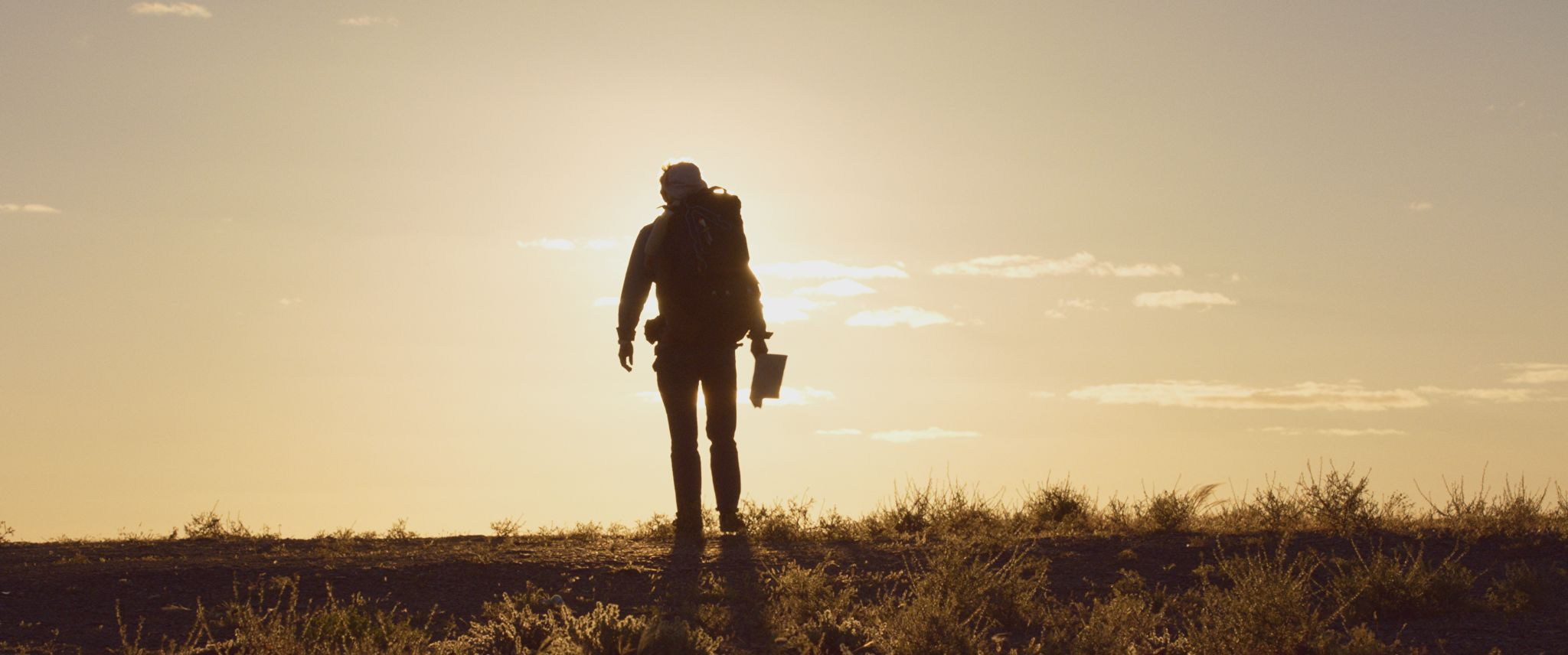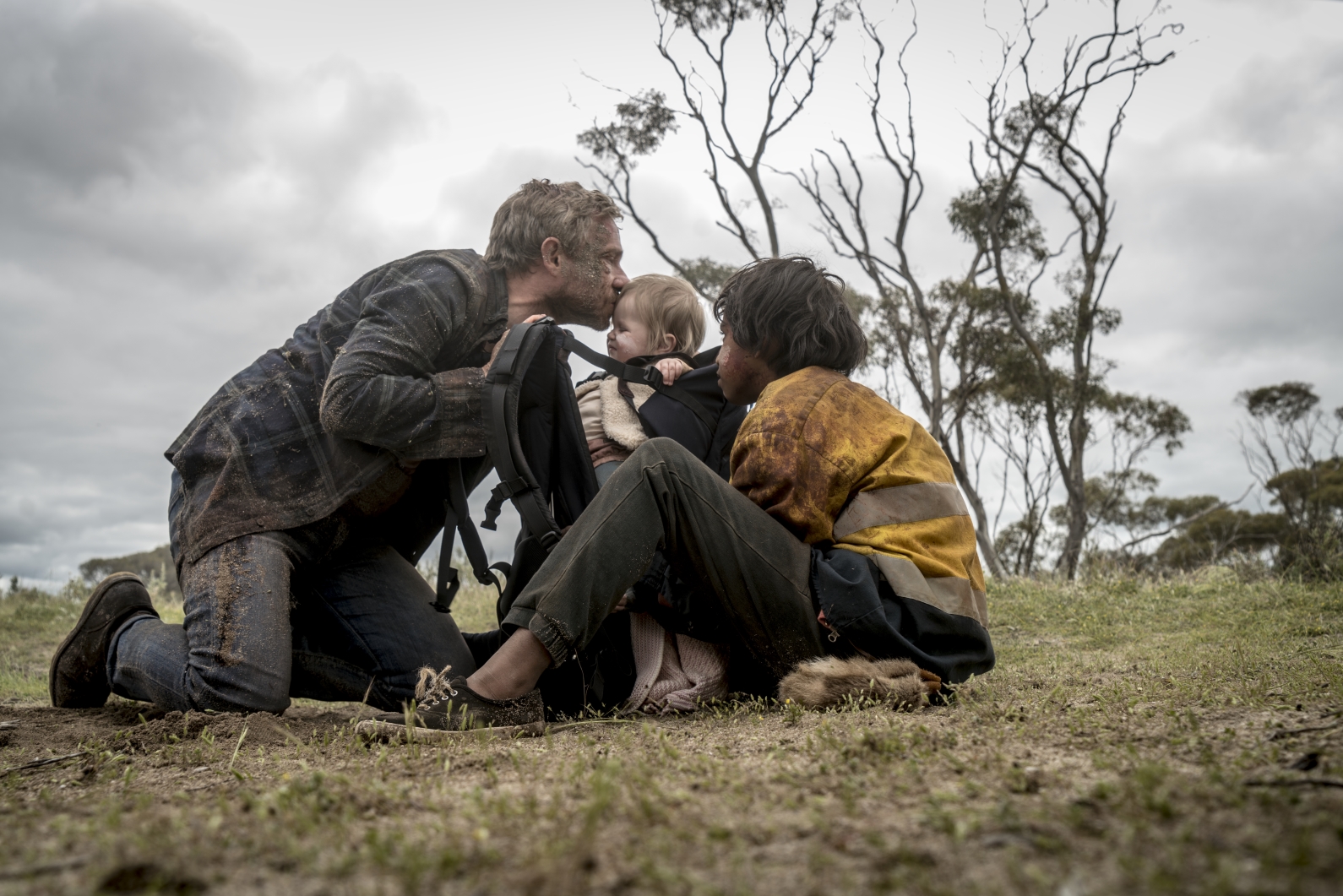Cargo
Posted on May 20, 2018 by John Elrod II in Featured, Reviews // 0 Comments
A new plague has ravaged society. Millions have presumably died, and the world as we know it has come to an end. One family fights to survive in this post-apocalyptic nightmare, but they cannot outrun the inevitable forever. Do you think this sounds familiar? Think again.
Cargo is a Netflix-released film directed by Yolanda Ramke and Ben Howling, from a screenplay written by Ramke and based on the duo’s 2013 short film of the same name. And, yes, it is also a post-apocalyptic zombie film; it has all the familiar tropes mentioned above and more: the dead have reanimated and want to eat you; if they bite you, you have a short time before you turn into them and start eating people, too. You’d be mistaken to write Cargo off as just another zombie movie, though.
In the 50 years since George A. Romero revolutionized the zombie genre with 1968’s Night of the Living Dead, it has been replete with stories of familiarity. Night of the Living Dead introduced the idea of zombies being reanimated flesh-eaters. Then, it was Romero’s Dawn of the Dead in 1978 that positioned zombiism as an allegory for consumerism. When one character asks “What are they doing? Why do they come here?”, referring to zombies mindlessly venturing to the mall, the answer she receives launched a thousand tropes in future zombie films: “Some kind of instinct. Memory, of what they used to do. This was an important place in their lives.”
That idea of reanimated corpses returning to places familiar to them in their former lives has, itself, been reanimated over and over again. Frankly, everything about the zombie genre has been done to death, so to speak, especially in the last 10-20 years. The 21st century has been overrun with zombies. We are conditioned to know what to expect from this genre, to the point where we watch and wait for the familiar beats.
Cargo still fits the bill as a recognizable zombie film, but it does breathe some fresh air into the concept of familiarity. This begins with its identity as an Australian film. Cargo is Australia’s first “Netflix Original” film, and that clearly matters. It’s not just set in Australia or about Australia; Cargo was filmed in Australia, by Australian filmmakers. Not only are Yolanda Ramke and Ben Howling Australian, but the film also employs prolific Australian cinematographer Geoffrey Simpson who has shot beautiful Australian films like Shine and Romulus, My Father. The film also boasts a cast that is almost exclusively made up of actors from Australia and New Zealand. The only part of this movie that is conspicuously not Australian is its leading man: Martin Freeman. This is intentional.
For his second film in a row, with Cargo following Black Panther (or, technically, vice versa), Martin Freeman plays a cinematic representation of colonialism. Unlike in Black Panther, he is not literally referred to as a “colonizer” here, but the allusions are as clear as those in Dawn of the Dead. Repeatedly, through Simpson’s camera, we are reminded of how expansive the Australia setting is, and through Ramke’s script we are shown several times just how ill-equipped Freeman’s character Andy is to survive in it. Meanwhile, an Aboriginal tribe, represented most often by young actress Simone Landers’ Thoomi and veteran David Gulpilil’s Daku, are largely thriving and serve as Andy’s best hope of salvation.
Beyond the colonial symbolism, Freeman’s distinctly British presence also helps the film’s tone. Ever since his days as Tim Canterbury on The Office, Martin Freeman has excelled at dry, sarcastic, self-deprecating British humor; he’s so brilliant and natural in it that it even comes through in a role where he’s playing American, as with the aforementioned Black Panther. What’s often overlooked, though, is that it’s not just British humor that plays this way; all British emotions are often played as subdued and restrained. How that works in Cargo is terrific. Any fear or anger Andy experiences seems to bottle up within Martin Freeman, only escaping in the most heightened moments, which creates an emotionally explosive environment of tension and anxiety. You don’t know when he is going to have an outburst, just as you’re equally unsure of when there will next be a jump scare, or if there even will be a next. It helps keep you on the edge of your seat, through a film that is literally about the amount of time that has passed since you last saw anyone be attacked by a zombie.
There are a number of films or television series you could find yourself reminded of, for various reasons, when watching Cargo, and most of them are zombie-related. Unexpected things you may think about, though, could be things like The Leftovers or The Last Wave, both of which David Gulpilil previously starred in. There’s also a universe where you could see Cargo as a weird combination of Cormac McCarthy’s The Road and the children’s book Are You My Mommy?. But what I found myself thinking about the most, as I watched Cargo, is one of my favorite movies Children of Men. The two are vaguely similar in plot, but it’s more the tone they share. There’s an eerie discomfort to Children of Men that sells it as a film about desperation, and Cargo is able to capture that same feeling. It’s what helps convince you what the film is carrying is important and precious.
Cargo Review Score
-
Plot – 8.5/108.5/10
-
Dialogue – 8/108/10
-
Directing – 8.5/108.5/10
-
Performances – 9.5/109.5/10
Cargo
Martin Freeman, Simone Landers, Anthony Hayes, Susie Porter, Caren Pistorius, Kris McQuade, David Gulpilil | Cinematographer: Geoffrey Simpson | Editors: Dany Cooper and Sean Lahiff | Writer: Yolanda Ramke | Directors: Yolanda Ramke and Ben Howling



